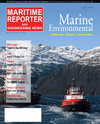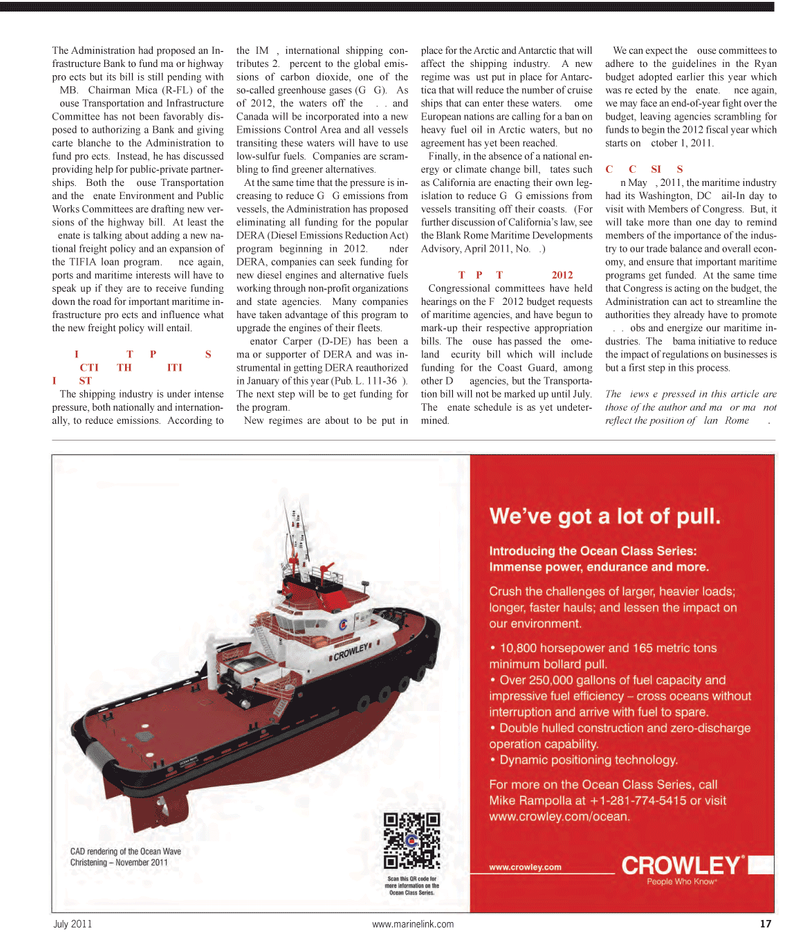
Page 17: of Maritime Reporter Magazine (July 2011)
The Green Ship Edition
Read this page in Pdf, Flash or Html5 edition of July 2011 Maritime Reporter Magazine
July 2011www.marinelink.com 17The Administration had proposed an In- frastructure Bank to fund maor highway proects but its bill is still pending with MB. Chairman Mica (R-FL) of the ouse Transportation and Infrastructure Committee has not been favorably dis- posed to authorizing a Bank and giving carte blanche to the Administration to fund proects. Instead, he has discussed providing help for public-private partner- ships. Both the ouse Transportation and the enate Environment and Public Works Committees are drafting new ver- sions of the highway bill. At least the enate is talking about adding a new na- tional freight policy and an expansion of the TIFIA loan program. nce again, ports and maritime interests will have to speak up if they are to receive funding down the road for important maritime in- frastructure proects and influence what the new freight policy will entail. IT PS CTI TH ITI IST The shipping industry is under intensepressure, both nationally and internation- ally, to reduce emissions. According to the IM, international shipping con- tributes 2. percent to the global emis- sions of carbon dioxide, one of theso-called greenhouse gases (GG). As of 2012, the waters off the .. and Canada will be incorporated into a new Emissions Control Area and all vessels transiting these waters will have to use low-sulfur fuels. Companies are scram- bling to find greener alternatives. At the same time that the pressure is in-creasing to reduce GG emissions from vessels, the Administration has proposed eliminating all funding for the popularDERA (Diesel Emissions Reduction Act) program beginning in 2012. nder DERA, companies can seek funding fornew diesel engines and alternative fuels working through non-profit organizations and state agencies. Many companies have taken advantage of this program to upgrade the engines of their fleets. enator Carper (D-DE) has been amaor supporter of DERA and was in- strumental in getting DERA reauthorizedin January of this year (Pub. L. 111-36). The next step will be to get funding for the program. New regimes are about to be put in place for the Arctic and Antarctic that will affect the shipping industry. A new regime was ust put in place for Antarc- tica that will reduce the number of cruiseships that can enter these waters. ome European nations are calling for a ban onheavy fuel oil in Arctic waters, but no agreement has yet been reached. Finally, in the absence of a national en- ergy or climate change bill, tates such as California are enacting their own leg- islation to reduce GG emissions from vessels transiting off their coasts. (For further discussion of California?s law, see the Blank Rome Maritime Developments Advisory, April 2011, No. .) T PT 2012 Congressional committees have held hearings on the F2012 budget requests of maritime agencies, and have begun to mark-up their respective appropriation bills. The ouse has passed the ome- land ecurity bill which will include funding for the Coast Guard, amongother D agencies, but the Transporta- tion bill will not be marked up until July. The enate schedule is as yet undeter- mined. We can expect the ouse committees to adhere to the guidelines in the Ryanbudget adopted earlier this year which was reected by the enate. nce again, we may face an end-of-year fight over the budget, leaving agencies scrambling for funds to begin the 2012 fiscal year which starts on ctober 1, 2011. CCSIS n May , 2011, the maritime industry had its Washington, DC ail-In day to visit with Members of Congress. But, it will take more than one day to remind members of the importance of the indus-try to our trade balance and overall econ- omy, and ensure that important maritime programs get funded. At the same time that Congress is acting on the budget, the Administration can act to streamline theauthorities they already have to promote .. obs and energize our maritime in- dustries. The bama initiative to reduce the impact of regulations on businesses is but a first step in this process. The iews epressed in this article are those of the author and ma or ma not reflect the position of lan Rome .

 16
16

 18
18
